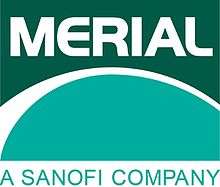Merial
 | |
| Industry | Animal healthcare |
|---|---|
| Founded | August 1, 1997 |
| Headquarters | Lyon, France |
| Revenue | €2.5 billion (2015) |
Number of employees | 6,900 |
| Parent | Sanofi |
| Website |
www |
Merial is a multinational animal health company.
In June 2016, the Sanofi announced it had struck an asset-swap deal with Boehringer Ingelheim, Sanofi would sell Merial (valuing it at €11.4 billion), whilst acquiring Boehringer's consumer health division (valuing it at €6.7 billion) and €4.7 billion in cash.[1]
Overview
In August 1997, Merial started as a joint venture between the animal health subsidiaries of Merck & Co. (MSD AgVet) and Sanofi-Aventis (Rhône-Mérieux). Merial is now the animal health subsidiary of Sanofi, formerly known as Sanofi-Aventis.
Merial produces many products and vaccines for domestic pets, farm animals and wildlife. Merial has about 6,900 employees and is present in more than 150 countries in the world.[2] Their sales in 2015 were about €2.5 billion.[3] Some of Merial's most popular products are Frontline, Heartgard, NexGard, Ivomec, PureVax and Previcox.
In October 2009, Merial announced it was investing 70 million US$ at its poultry vaccines plant in Nanchang Hi-tech Development Zone, China. On March 9, 2010, Sanofi-Aventis announced[4] it had exercised an option to combine Merial with Intervet/Schering Plough, the animal health business of Merck. The new joint venture would be equally owned by Merck and Sanofi-Aventis. On March 22, 2011, they announced the mutual termination of their agreement to form a new animal health joint venture.
Merial's global headquarters is located at Lyon, France since 2011[5] (after having been located at Duluth, Georgia).
Investigations
Merial was investigated in connection with a 2007 United Kingdom foot-and-mouth outbreak, after a strain of foot-and-mouth disease alleged to have been sourced from one of their research facilities was found at Pirbright, a farm in Surrey, England, in August 2007.[6] The investigators concluded that "release was most likely due to escape of live virus from the drainage system that connects the vaccine production plant to the sodium hydroxide treatment tanks on another part of the Pirbright site."[7]
The two independent inquiries found that Merial complied with all regulations and committed no breaches of biosecurity.
References
- ↑ "Aiming for top dog status, Sanofi and Boehringer swap animal and consumer health units - FiercePharma".
- ↑ "Company | Merial". merial.com. Retrieved 2015-11-03.
- ↑ "Sanofi - Key facts & figures". en.sanofi.com. Retrieved 2015-11-03.
- ↑ "Sanofi-aventis and Merck to create a Global Leader in Animal Health" (PDF). March 8, 2010. Retrieved November 3, 2015.
- ↑ "Sanofi has chosen the city of Lyon to establish the global headquarters of Merial, its animal health division".
- ↑ "Initial report on potential breaches to biosecurity at the Pirbright site, 2007". UK Health and Safety Executive. May 12, 2008. Retrieved 2009-04-22.
- ↑ National Emergency Epidemiology Group (29 August 2007). "FMD in Surrey, UK, 2007: Epidemiology report on the probable release of FMD virus at the Pirbright site and the transmission of infection to the first infected cattle herd, from investigations up to 29 August 2007 (Day 26)" (PDF). UK Department for Environment, Food and Rural Affairs (DEFRA). Retrieved 2009-04-22.